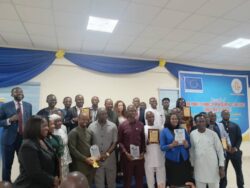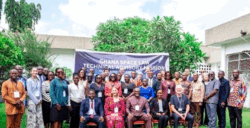By Peter Martey AGBEKO
Ghana’s fight against illegal mining—popularly called galamsey—has taken on renewed urgency as the devastating impact of this environmental scourge continues to unfold before our very eyes.
Forests are being felled, rivers turned murky brown, and fertile farmlands destroyed, all for a few ounces of gold.
But as we look for sustainable solutions, we must confront a troubling trend that severely undermines our efforts: the deportation of foreign nationals involved in galamsey without due trial or punishment.
This approach may seem swift and decisive on the surface. But in reality, deportation without prosecution is a policy that indirectly encourages environmental crime.
The Illusion of Justice
Deportation might feel like action, but it is not justice. When foreign nationals caught red-handed engaging in illegal mining are simply put on a flight out of the country, we deny ourselves—and our environment—the justice that is due.
These individuals leave unscathed, their networks intact, and in many cases, they return through our porous borders or continue coordinating operations remotely.
Meanwhile, Ghanaian accomplices are left behind and often escape scrutiny altogether, especially when investigations are abruptly halted once foreign collaborators are deported. The result is a fractured enforcement process where the real kingpins and financiers remain untouched.
Sending the Wrong Signal
Let’s be clear: deportation without prosecution sends the dangerous message that Ghana is a soft target for environmental crime.
It emboldens foreign actors who know that at worst, they’ll be sent home—no jail time, no fines, no asset seizure. For many, that’s a risk worth taking, especially when the profits of illegal gold mining are so high.
Contrast this with how other countries treat environmental crimes. In Brazil, illegal miners who devastate the Amazon face stiff penalties, including lengthy prison terms and seizure of assets.
In the United States, environmental crimes are treated as felonies. Why should Ghana be any different—especially when our lands and rivers are on the line?
Undermining Rule of Law and Sovereignty
Deportation without trial creates a double standard in our justice system. Ghanaian citizens caught in galamsey activities are prosecuted, fined, and imprisoned. Foreign nationals, on the other hand, are flown out without accountability.
This not only undermines the rule of law but insults the dignity of our legal institutions and the sovereignty of our nation.
Every environmental crime committed on Ghanaian soil must be addressed on Ghanaian soil, through our courts, under our laws.
What Must Be Done
If Ghana is serious about winning the war on galamsey, the following steps are crucial:
End Deportation Without Trial: All individuals—Ghanaian or foreign—must face full prosecution when found culpable in illegal mining.
Strengthen Investigative Capacity: Law enforcement must be empowered to investigate and dismantle entire networks, not just arrest surface operators.
Seize and Confiscate Assets: Equipment, vehicles, and proceeds from illegal mining should be seized and repurposed to support environmental restoration.
Publicly Publish Convictions: Transparency in the prosecution of environmental crimes can serve as a deterrent and build public confidence.
Tighten Border Security: To prevent re-entry of deported offenders, we must bolster surveillance and intelligence sharing along our borders.
Conclusion
Ghana’s rivers are not just bodies of water. They are the lifelines of our communities. Our forests are not just trees—they are carbon sinks, biodiversity havens, and sacred lands. To protect them, we must show that illegal mining is not a minor infraction, but a grave offense.
Deportation without trial may feel expedient, but it is short-sighted. It tells the world that you can come to Ghana, break our laws, poison our rivers—and go home free. That is not justice. That is surrender. And Ghana cannot afford to surrender in this fight.










